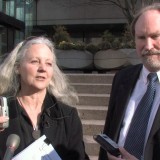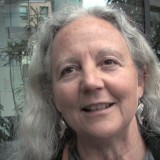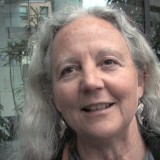Yesterday, on the penultimate day of the Cohen Commission’s hearings on aquaculture and diseases, Alexandra Morton finally took the stand. To say the event lived up to its billing is an understatement, as the Inquiry often characterized by technocratic tedium was jolted to life in its final rounds.
At the heart of the conflict lay the pattern of breathtaking industry-government collusion and secrecy that has characterized the aquaculture issue for decades – to a degree even I didn’t fully fathom until now.
Joining Morton and Living Oceans Society’s Catherine Stewart (who acquitted herself admirably) on the stand were two industry reps: Clare Backman, Director of Sustainability for Marine Harvest (now there’s an oxymoron), and Mia Parker, formerly of Grieg Seafoods, but now of DFO.
The Commission’s lawyer introduced Ms. Parker saying, “I’m not asking you to wear your DFO hat today, as that would be confusing.”
It’s actually simpler than it sounds. It’s called a conflict of interest.
And yet, charting this pair’s career paths does require a modicum of concentration, lest one gets lost in the whirlwind of the industry-government revolving door.
You see, Backman used to work for the Province, back when it had jurisdiction over aquaculture. More specifically, he was instrumental in selecting sites for fish farms on the coast. Then, in 2002, he went to work for the industry, ending up at Marine Harvest. Parker, on the other hand, worked for the industry up until recently, whereupon she transferred to government – specifically, designing aquaculture regulations under the new management regime of DFO (Morton and her lawyer Greg McDade forced this change of jurisdiction in 2009 with a landmark legal victory at the BC Supreme Court).
The problematic nature of this arrangement – from the public’s perspective – was evident when McDade, representing Morton at the Inquiry as well, asked Backman to commit to a higher level of fish health data reporting. Backman responded, “We’ll comply with whatever the license requirements are.”
Those would be the license requirements Ms. Parker is now helping to author. Are you with me so far?
In another telling exchange, we heard about a disease referred to as marine anemia, or plasmacytoid leukemia, that was ravaging Chinook farms in the late 80s and early 90s – a pathogen that apparently can jump from farmed Chinook to wild sockeye. This disease was one of Dr. Kritsti Miller’s prime suspects for the mystery virus afflicting millions of Fraser River sockeye with pre-spawn mortality – that which she conceded may hold the answer to the whole mystery the Commission is seeking to solve.
When Morton’s lawyer Greg McDade attempted to enter a summary by his client on the subject into the record, he was met by an instant chorus of objections from counsel for the Federal Government, the Province and the aquaculture industry, respectively. I observed no less than eight objections between them within minutes.
At one point, McDade fired back, “I don’t know why counsel for the Province is trying so hard to keep this evidence from being presented.” By this point, I’d wager most members of the audience could venture a hypothesis or two on that subject.
In the end, Justice Cohen tabled the matter for a later date – indicating he wanted to read this summary document before reaching a final decision on its inclusion in the Inquiry’s public record. However, that didn’t stop McDade from going through several key pages with Morton on the record, expanding on some matters I covered in detail in last week’s column – such as the correlation between the timing of locating these farms on the Fraser sockeye migratory route, circa 1992, and the productivity of said wild fish falling of a cliff.
Of particular note were the Province’s fish health audit records, recently made public for the first time through the Commission (this after counsel for the Campbell/Clark Government initially argued against disclosing them, before finally backing down early last week). McDade zeroed in on one specific data set, which showed that on a particular Chinook farm located in the pathway of migrating juvenile Fraser sockeye in the Discovery Islands area near Campbell River, 23 out of 24 fish sampled bore symptoms of marine anemia.
And yet, somehow no disease outbreak, or “fish health incident”, as it is referred to, was publicly reported or investigated further.
And why not? Because the decision of whether to report it rests in the hands of the fish farm company’s own veterinarians – as this exchange demonstrated:
McDade: So if your farm vets don’t make a diagnosis, it doesn’t get reported.
Long pause
Backman: That’s correct – because in their opinion it doesn’t exist.
McDade: So if 23 out of 24 of these fish die of those symptoms, it doesn’t exist.
You got that right. The disease doesn’t exist unless the industry says it does!
Backman’s rationale, amid courtroom gasps: “Yes, it’s important it gets into the public domain, but it’s also important it doesn’t get taken out of context.” In other words, best err to the side of secrecy and the industry’s interests.
If you’re concerned by what you’re now reading, consider what the Commission heard about the PhD thesis of a recent expert on the stand at the Commission, Dr. Craig Stephen, of the University of Calgary (a PhD student at the University of Saskatchewan at the time of the paper). In 1995, Stephen wrote: “Evidence supporting the hypothesis that marine anemia is a spreading, infectious neoplastic disease could have profound regulatory effects on the salmon farming industry.”
On the stand at the Commission years later (two weeks ago), Dr. Stephen would second-guess his own conclusions. And he’s not alone.
Another expert scientist, Dr. Michael Kent, before the Commissioner’s very eyes, backtracked on no less than 10 papers he’d published on marine anemia in journals over a decade.
Is it possible these scientists would rather disavow years of their own research than concede this disease in farmed fish could be related to the mystery virus Dr. Miller is pursuing? A virus which may in turn be “the smoking gun” for collapsing Fraser sockeye runs, as Miller recently told the Commission? If so, talk about taking one for the team!
Morton suggested that in light of Dr. Kent’s astonishing reversal on his own oft-published research, he should be going back to all those publications and retracting said articles – a reasonable request, given Dr. Kent’s own testimony on the stand (testimony which included him suggesting at one point that ocular tumours sent to the Smithsonian cancer registry may have been nothing more than some misdiagnosed inflammation that he really didn’t examine all that closely at the time).
And yet, it was somehow Ms. Morton’s credibility that was on trial on this day – as Canada’s counsel suggested her summary of this disease story was “full of hearsay and speculation”, while the industry’s lawyer impugned her professional conduct, going as far as to accuse her of breaching her code of ethics as a Registered Professional Biologist. Through it all, Morton bravely, calmly stood her ground.
Under the hail of objections as Greg McDade attempted to get Morton’s summary document on the record, his client boiled it all down to one salient point for the Commissioner: “The only thing I want you to take from this is that Dr. Miller needs to be able to do her work – someone who is an expert in disease needs to be free to look at this.” (The Commission also heard of the enormous obstacles Miller’s research is facing at its most critical juncture, including having her funding pulled – through political interference by the Harper Government).
The fact is, throughout the aquaculture and disease hearings of the past several weeks, most of the Commission’s scientific experts either work for or have worked for the industry or government – a point Morton made clear in the final, heated exchange of the day.
The lawyer for the Aboriginal Aquaculture Coalition (i.e., representing First Nations with a working partnership with the industry) asked Ms. Morton why her perspective differs so greatly from the phalanx of industry and government scientists who have one by one maintained salmon farms have nothing to do with the plight of Fraser sockeye. Morton remained cool under fire, replying that unlike all of them, “I don’t work for a university, the government, the industry, or a First Nation – I’m completely independent.”
The lawyer, Stephen Kelliher, shot back, with a heavy dose of sarcasm: “So you’re pure, then. You’re the only one who isn’t corrupted?” Morton simply smiled and replied, “Perhaps,” as the increasingly raucous gallery erupted in cheers.
And that was the kind of day it was at the Cohen Commission. A fitting emotional climax to what was easily the most exciting and revealing – while also frustrating and appalling – day of the Inquiry. The same panel, including Morton, returns to the stand today for the Commission’s final public session before closing arguments in November.
One day left and it feels like we’re only just now really getting somewhere.



